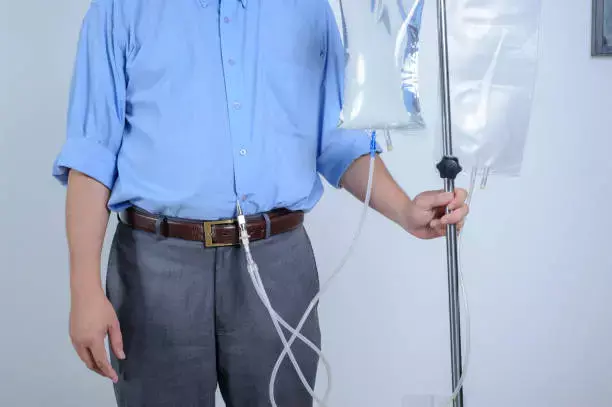- Home
- Medical news & Guidelines
- Anesthesiology
- Cardiology and CTVS
- Critical Care
- Dentistry
- Dermatology
- Diabetes and Endocrinology
- ENT
- Gastroenterology
- Medicine
- Nephrology
- Neurology
- Obstretics-Gynaecology
- Oncology
- Ophthalmology
- Orthopaedics
- Pediatrics-Neonatology
- Psychiatry
- Pulmonology
- Radiology
- Surgery
- Urology
- Laboratory Medicine
- Diet
- Nursing
- Paramedical
- Physiotherapy
- Health news
- Fact Check
- Bone Health Fact Check
- Brain Health Fact Check
- Cancer Related Fact Check
- Child Care Fact Check
- Dental and oral health fact check
- Diabetes and metabolic health fact check
- Diet and Nutrition Fact Check
- Eye and ENT Care Fact Check
- Fitness fact check
- Gut health fact check
- Heart health fact check
- Kidney health fact check
- Medical education fact check
- Men's health fact check
- Respiratory fact check
- Skin and hair care fact check
- Vaccine and Immunization fact check
- Women's health fact check
- AYUSH
- State News
- Andaman and Nicobar Islands
- Andhra Pradesh
- Arunachal Pradesh
- Assam
- Bihar
- Chandigarh
- Chattisgarh
- Dadra and Nagar Haveli
- Daman and Diu
- Delhi
- Goa
- Gujarat
- Haryana
- Himachal Pradesh
- Jammu & Kashmir
- Jharkhand
- Karnataka
- Kerala
- Ladakh
- Lakshadweep
- Madhya Pradesh
- Maharashtra
- Manipur
- Meghalaya
- Mizoram
- Nagaland
- Odisha
- Puducherry
- Punjab
- Rajasthan
- Sikkim
- Tamil Nadu
- Telangana
- Tripura
- Uttar Pradesh
- Uttrakhand
- West Bengal
- Medical Education
- Industry
Low Parathyroid Levels tied to Peritonitis in Incident peritoneal dialysis patients

Abnormalities in serum parathyroid hormone (PTH) are exceedingly common in end-stage renal disease (ESRD) patients, on maintenance dialysis and associated with cardiovascular disease, disturbances in bone mineral disorders, even increased morbidity and mortality in most epidemiologic studies. In a recent study, researchers have reported that the low levels of PTH are associated with the peritonitis among incident peritoneal dialysis (PD) patients. The study findings were published in the BMC Nephrology on January 29, 2021.
Peritoneal dialysis related peritonitis remains the major and life-threatening infection-related complication and is closely related to loss of catheter function, impairment of the peritoneal membrane, eventually discontinuation of peritoneal dialysis therapy, conversion to hemodialysis. Peritonitis results in an overall mortality rate of up to 15% of PD patients. Risk factors associated with peritonitis, including older age, diabetes, hypoalbuminemia, also reflect a status of malnutrition in PD patients. Therefore, researchers of the Guizhou Provincial People's Hospital, China, suspected that the low serum PTH levels may play a role in the incidence of PD-related peritonitis and conducted a study, to evaluate the association of serum PTH levels with PD-related peritonitis.
It was a single-center and retrospective study in 270 incident PD patients who were maintained on dialysis between January 2012 and December 2018. Researchers categorized the patients into three groups by serum PTH levels as follows:
low-PTH group, PTH < 150 pg/mL;
middle-PTH group, PTH 150-300 pg/mL;
high-PTH group, PTH > 300 pg/mL.
Key findings of the study were:
♦ During a median follow-up of 29.5 months, the researchers noted that the incidence rate of peritonitis was 0.10 episodes per patient-year.
♦They also noted that gram-positive organisms were the most common causative microorganisms (36.2%), and a higher percentage of gram-negative organisms was observed in patients with low PTH levels.
♦ They found that low PTH levels were associated with older age, higher eGFR, higher hemoglobin, calcium levels and lower phosphate, alkaline phosphatase levels.
♦ Upon multivariate adjustment, they found lower PTH levels, as an independent risk factor for peritonitis episodes [hazard ratio 1.643].
The authors concluded, "The present study demonstrates that low PTH levels are independently associated with a higher risk of peritonitis incidence in incident PD patients. Our results support the importance of maintaining proper PTH levels. Physicians should pay more attention to the predictive value of PTH on infectious events in PD patients. Future large-scale studies should afford insights for understanding the potential mechanisms how PTH levels predict peritonitis incidence."
For further information:
https://bmcnephrol.biomedcentral.com/articles/10.1186/s12882-021-02241-0
Dr Kartikeya Kohli is an Internal Medicine Consultant at Sitaram Bhartia Hospital in Delhi with super speciality training in Nephrology. He has worked with various eminent hospitals like Indraprastha Apollo Hospital, Sir Gangaram Hospital. He holds an MBBS from Kasturba Medical College Manipal, DNB Internal Medicine, Post Graduate Diploma in Clinical Research and Business Development, Fellow DNB Nephrology, MRCP and ECFMG Certification. He has been closely associated with India Medical Association South Delhi Branch and Delhi Medical Association and has been organising continuing medical education programs on their behalf from time to time. Further he has been contributing medical articles for their newsletters as well. He is also associated with electronic media and TV for conduction and presentation of health programs. He has been associated with Medical Dialogues for last 3 years and contributing articles on regular basis.
Dr Kamal Kant Kohli-MBBS, DTCD- a chest specialist with more than 30 years of practice and a flair for writing clinical articles, Dr Kamal Kant Kohli joined Medical Dialogues as a Chief Editor of Medical News. Besides writing articles, as an editor, he proofreads and verifies all the medical content published on Medical Dialogues including those coming from journals, studies,medical conferences,guidelines etc. Email: drkohli@medicaldialogues.in. Contact no. 011-43720751


